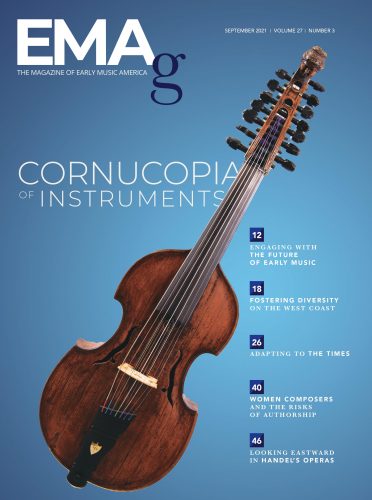
Current EMA members can read this and previous issues of EMAg. Please login or become a member today!
TABLE OF CONTENTS
Features
- On the Cover: Cornucopia of Instruments by Laura Stanfield Prichard
- The Musical Instrument Museum in Phoenix, AZ, is America’s most interactive public collection of musical instruments, which are exhibited in open displays that include attire, photos, and maps grouped by country.
- Engaging with the Future of Early Music by Ashley Mulcahy
- EMA’s 2021 Emerging Artists Showcase and Young Performers Festival comprised a health number of musicians who are contributing new energy and hope to the field.
- Fostering Diversity on the West Coast by David Gordon Duke
- Not a day goes by without discussions of the nature of the so-called classical canon, of how we must redress past omissions and exclusions, and of strategies for a more inclusive future.
- Adapting to the Times by Jarrett Hoffman
- An array of health, political, and social issues has compelled early-music organizations to rethink the ways they go about business, a major challenge in preserving what they do best and embracing what will keep them relevant.
- Women Composers and the Risks of Authorship by Rebecca Cypess
- The career trajectories of Viennese composer Marianna Martines and Roman composer Maria Rosa Coccia mirrored one another in some ways, though the former had much more success than the latter.
- Looking Eastward in Handel’s Operas by Annalise Smith
- Of the 800 of so opera seria librettos written between 1640 and 1740, about a third had non-European or so-called Eastern settings. Nearly half of Handel’s 42 operas are set in exotic locales or feature characters from there.
Departments
- From the Editor: Upwards Slowly
- From the Executive Director: Moving On
- The Art of the Amateur: In Early and Modern
- EMA En Courant – News from Around the Early Music Community
- Canto: Music in Transition by Kevin Leong
- CD & Book Reviews
- EMAg Puzzle by Joshua Kosman
- Musings: Jeanne Lamon and the History of Historical Performance by Thomas Forrest Kelly

